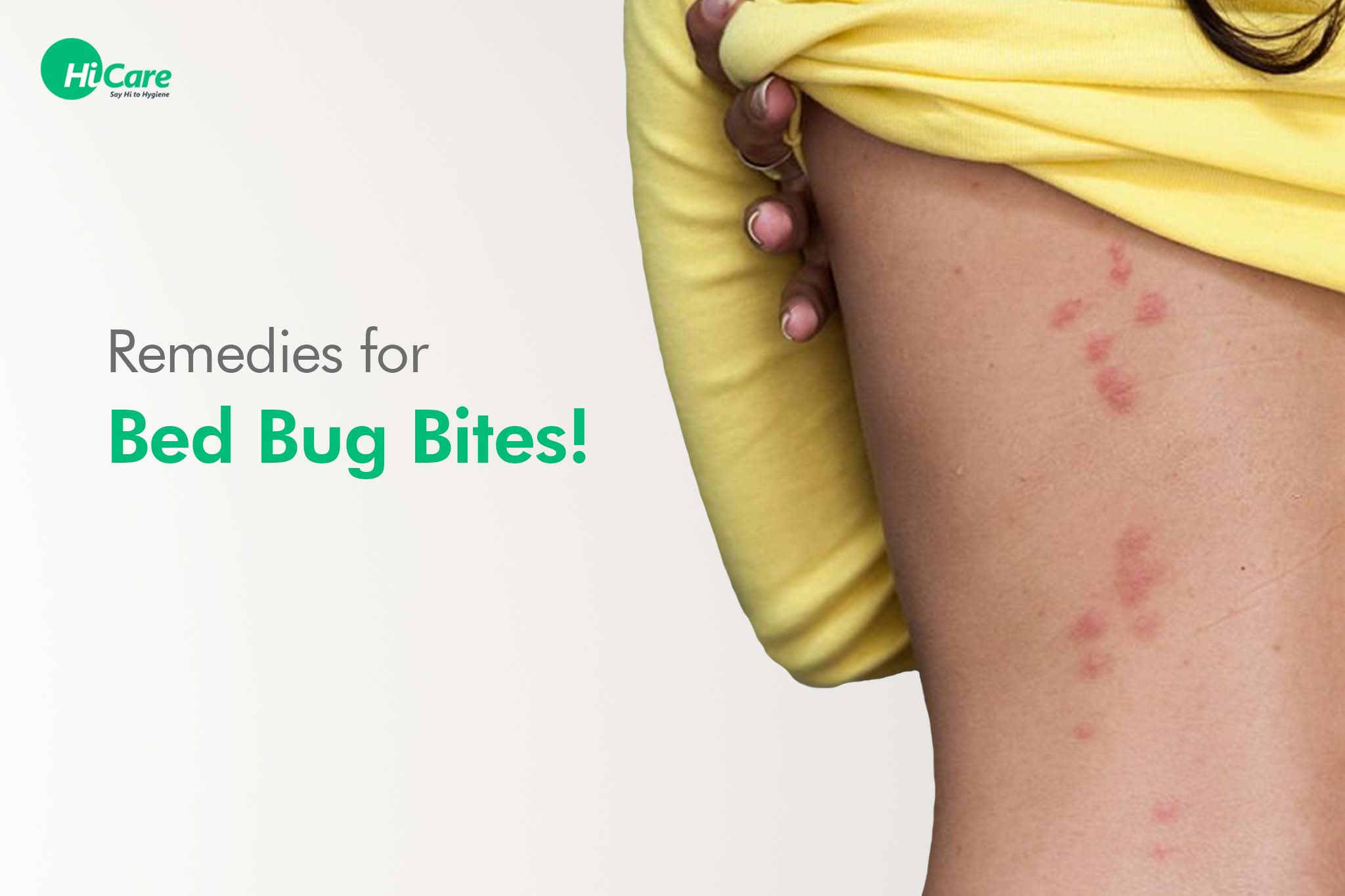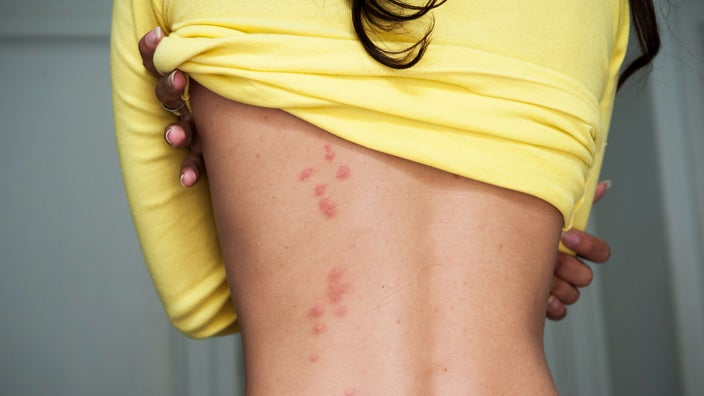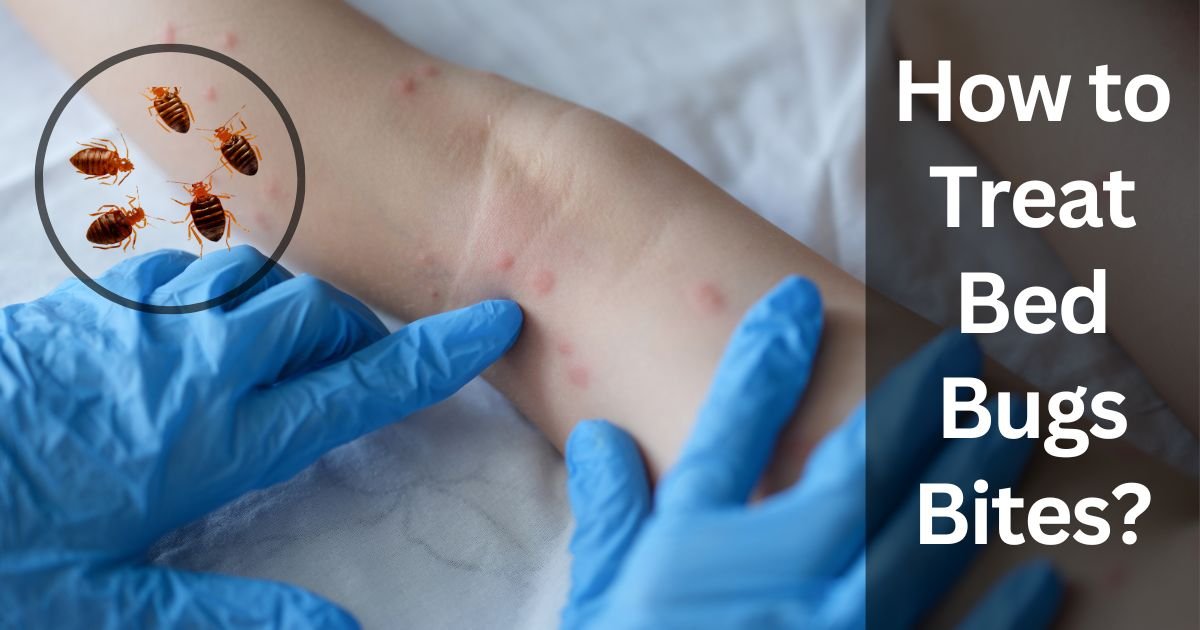Treat bed bug bites by washing the area with soap and water and applying a corticosteroid cream for relief. If itching persists, consider taking an antihistamine.
Dealing with bed bug bites can be both uncomfortable and distressing. These pesky insects strike at night, leaving a trail of itchy welts on the skin. Identifying bed bug bites is the first step to finding relief. They often appear as raised, red bumps that might be in a line or clustered.
While bites typically resolve on their own, treating the skin properly can alleviate symptoms and prevent infection. Home remedies and over-the-counter products provide much-needed relief and are usually sufficient to manage the symptoms. Remember to keep the affected area clean and to resist the urge to scratch, as this can cause further irritation or infection. Following these steps promptly can make a big difference in reducing discomfort from bed bug bites.
The Rise Of Bed Bugs
The rise of bed bugs has become a notable concern in homes and hotels worldwide. These tiny pests can cause discomfort and stress with their relentless bites. Understanding and managing bed bug bites is critical for comfort and health.
Identifying Bed Bug Bites
Bed bug bites often appear as small, red, itchy bumps, usually in a line or cluster. It’s common to find them on exposed skin, such as the arms, legs, or back, after sleeping. Although they resemble mosquito bites, bed bug bites tend to persist longer and may cause a stronger itch.
The Resurgence Of Infestations
Infestations of bed bugs have surged due to increased travel and resistance to common pesticides. These small brownish insects hide in mattresses, bed frames, and other furniture, emerging to feed at night. To manage an infestation, professional extermination combined with thorough cleaning and monitoring is essential.
:max_bytes(150000):strip_icc()/Health-bed-bug-bite-7375267-Horiz-v1-00de2c01584b4e8c85389587fe3f0829.jpg)
Credit: www.health.com
Immediate Steps After Being Bitten
Waking up to red, itchy bed bug bites can be unsettling and uncomfortable. Knowing what to do immediately after being bitten can not only offer relief but also prevent infection. Follow these quick steps to minimize discomfort and ensure proper healing right after you discover bed bug bites.
Cleaning The Affected Area
As soon as you notice bite marks, it’s crucial to clean them:
- Use soap and water to gently cleanse the bite areas.
- Pat dry with a clean towel; avoid rubbing the bites.
Applying Anti-itch Creams
After cleaning, reduce itchiness and irritation:
- Apply a calamine lotion or anti-itch cream suitable for bug bites.
- Consider over-the-counter antihistamines if itching is severe.
Home Remedies For Relief
Waking up with itchy, red bites can be a nightmare. Yet, bed bug bites, common as they are, can be soothed with simple home remedies. These treatments offer quick relief and help soothe the irritation. Let’s explore some effective ways to treat those pesky bed bug bites right at home.
Baking Soda And Water Paste
Baking soda, known for its alkaline properties, can neutralize the acidic bed bug saliva. This helps reduce itchiness and swelling.
- Mix one teaspoon of baking soda with a few drops of water.
- Stir until it forms a thick paste.
- Apply to the affected area and leave for 10 minutes.
- Rinse with lukewarm water.
Aloe Vera Gel Application
The cooling effect of aloe vera soothes the skin, while its antibacterial properties prevent infection.
- Apply pure aloe vera gel to the bite.
- Gently massage it in.
- Repeat 2-3 times a day.
Cool Compresses
Cool compresses can reduce inflammation and provide immediate relief from itching.
- Wrap ice cubes in a cloth.
- Place it on the affected area for 10-15 minutes.
- Remove for a bit and reapply if needed.

Credit: hicare.in
Over-the-counter Solutions
Dealing with bed bug bites can be frustrating and uncomfortable. Finding the right over-the-counter solution is crucial. These treatments can ease symptoms until bites heal.
Several options provide relief and help manage symptoms. It’s best to choose based on your specific reaction.
Antihistamines For Allergic Reactions
Allergic reactions to bed bug bites are common. Over-the-counter antihistamines can reduce itching and swelling. They come in pill form or as a liquid.
- Diphenhydramine (Benadryl)
- Loratadine (Claritin)
- Cetirizine (Zyrtec)
Read labels carefully. Follow dosage instructions. Some may cause drowsiness. Do not operate machinery if affected.
Topical Steroid Creams For Inflammation
For inflammation, topical steroid creams reduce redness and swelling. Hydrocortisone cream, available over-the-counter, is a popular choice.
| Product | Usage Guidelines |
|---|---|
| 1% Hydrocortisone cream | Apply a thin layer to affected area up to 4 times daily. |
Avoid prolonged use. It may cause skin thinning. Consult a doctor if symptoms persist.
When To See A Doctor
Bed bug bites often cause itchy welts. These can be treated at home. Yet, certain reactions need medical attention. Knowing when to seek help is important for your health.
When to See a DoctorSigns of a Severe ReactionSigns Of A Severe Reaction
Some people may react strongly to bed bug bites. Look out for these symptoms:
- Hives or rash spreading beyond the bite area
- Tightness in the chest or trouble breathing
- Swelling of the face, lips, or tongue
- Faintness or dizziness, signaling a drop in blood pressure
- A feeling of nausea or flu-like symptoms
Notice these signs? Seek immediate medical care.
Potential for InfectionPotential For Infection
Scratching bites can cause infections. Be on alert for signs like:
- Increased redness or warmth around the bites
- Pus or discharge from the bites
- Red streaking spreading from the bite
- Fever or chills
- Swollen lymph nodes near the bite area
These symptoms warrant a doctor’s visit.

Credit: www.goodrx.com
Preventing Future Bites
Discovering bed bug bites can be worrying and uncomfortable. Preventing future bites is critical for your peace of mind and health. By taking certain measures, you can ensure that bed bugs won’t bother you again. Follow these tips to safeguard your home from these pesky invaders.
Protective Bedding Covers
Wrap your mattress and pillows with protective covers. These covers have small pores that trap bed bugs. They can’t bite through these barriers. Choose high-quality, bed bug-proof encasements. Make sure to check them regularly for tears.
- Eliminate bed bug hiding spots
- Trap bugs within the covers
- Inspect covers often for damage
Regular Cleaning And Vacuuming
Dedicate time each week for cleaning and vacuuming. Focus on your bed, furniture, and areas where bed bugs hide. Use the vacuum’s hose to reach tight spots. Always dispose of the vacuum bag immediately to prevent bugs from escaping.
| Tasks | Frequency |
|---|---|
| Vacuum floors | Weekly |
| Clean bedding | Weekly |
| Inspect furniture seams | Monthly |
Clean your living space consistently. Always keenly scrutinize any second-hand furniture before bringing it home. Keep clutter to a minimum. This reduces bed bug hiding spots and makes it easier to spot an infestation early.
Professional Extermination Options
Dealing with bed bug bites requires not only treating the skin but also eliminating the pests responsible. Professional extermination options stand out as effective solutions for long-term relief. Here, explore reputable pest control services and the various treatments they offer.
Identifying A Reputable Pest Control Service
Choosing a qualified exterminator means considering several factors:
- License and Certification – Confirm that the provider has the required credentials.
- Experience – Look for a service with a proven track record.
- Reviews – Check customer feedback to gauge satisfaction levels.
- Methods Used – Ensure they offer treatments that suit your needs and preference.
- Guarantee – Select a service that stands behind their work.
Understanding Chemical And Heat Treatments
Chemical and heat treatments are among the most common extermination methods. Each has its benefits:
Chemical Treatments:
- Pesticides target bed bugs in all life stages.
- Technicians use various formulas for comprehensive coverage.
- Rooms must be prepared for safety during application.
- Multiple visits may be necessary for complete eradication.
Heat Treatments:
- High temperatures reliably kill bed bugs.
- Heat permeates furniture and textiles, leaving no hiding spots.
- One treatment is often sufficient to address an infestation.
- No chemicals mean no residue left behind.
Both options require specialized equipment and skilled technicians. Discuss your concerns and expectations with the exterminator to find what’s best for your home.
Long-term Strategies For A Bed Bug-free Home
Embarking on a journey towards a bed bug-free home requires commitment and smart strategies. Once you have addressed the bites, focus shifts to long-term prevention. These strategies ensure your home remains a sanctuary, free from the worry of bed bug re-infestation.
Monitoring For Signs Of Bed Bugs
Regular checks play a crucial role in prevention. Start by examining your bedroom. Look for rust-colored spots on sheets, tiny eggs or shed skins in mattress seams, and live bugs in crevices.
Use monitoring tools to your advantage. Bed bug interceptors under the legs of your bed can capture bugs. Glue traps along room perimeters also help.
Keep a close eye on frequent spots such as the bed area. Include the living room and any places you rest, noting any signs.
Precautionary Measures While Traveling
Travel can increase the risk of bringing bed bugs home. Practice cautious travel habits to avoid this.
- Inspect lodgings: On arrival, check hotel beds and furniture for signs of bed bugs.
- Use luggage racks: Keep your luggage on metal racks away from walls and beds.
- Protect your belongings: Seal your suitcase in a plastic bag during your stay, especially in high-risk areas.
- Handle laundry with care: Upon returning home, launder all clothes at a high temperature to eliminate potential hitchhikers.
Adopting these practices requires minimal effort but offers significant protection against bed bug invasions.
Frequently Asked Questions Of How To Treat Bed Bugs Bites?
What Are Symptoms Of Bed Bug Bites?
Bed bug bites often appear as small, red, itchy welts. They can occur in a line or cluster on skin exposed during sleep. Each bite can be slightly swollen and may turn into a blister.
How Can Bed Bug Bites Be Treated At Home?
Home treatment includes washing the bites with soap and water. Applying an anti-itch cream or a natural remedy like aloe vera can reduce discomfort. Resist scratching to prevent infection.
Are Bed Bug Bites Dangerous?
Bed bug bites are not usually dangerous but can lead to allergenic reactions in some people. If symptoms escalate or an allergic response is suspected, seeking medical advice is important.
Can Bed Bug Bites Spread Disease?
Presently, there’s no evidence that bed bug bites spread infectious diseases. However, excessive scratching may lead to skin infections.
Conclusion
Treating bed bug bites can be a straightforward process. Begin with cleaning the area and applying antiseptic creams to alleviate itching. Should symptoms persist, consult your doctor for advanced care. Remember, maintaining a clean environment is key to preventing future infestations.
Stay vigilant and bite-free!

I’m MD Tanvir, and I bring years of expertise gained from working closely with pest control companies to the forefront. My journey in the industry has inspired me to launch Bug Battler, a platform aimed at equipping people with the know-how to combat pests autonomously. Through Bug Battler, I aim to empower individuals with practical insights to tackle pest infestations effectively.

